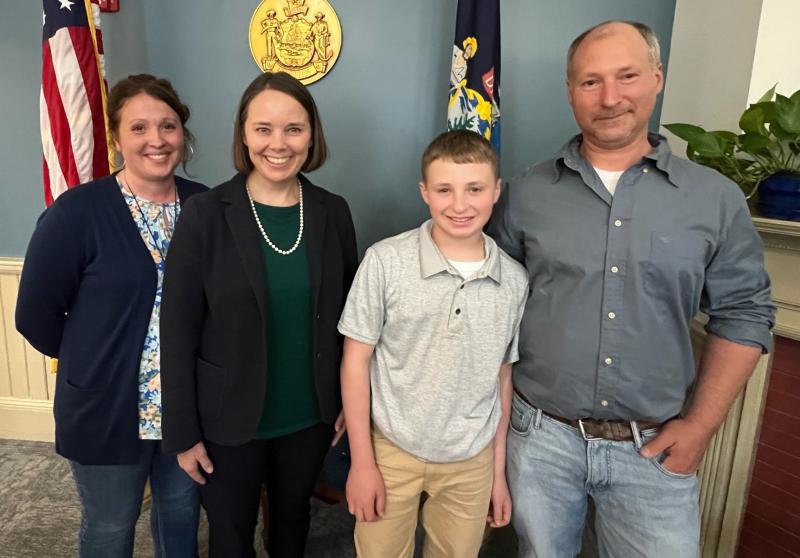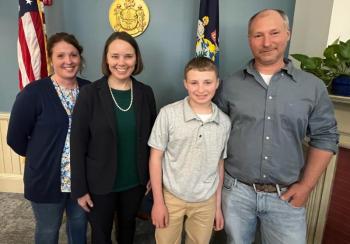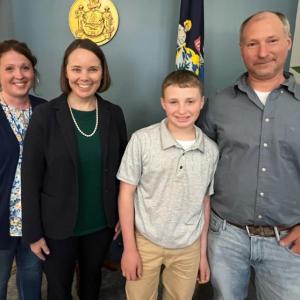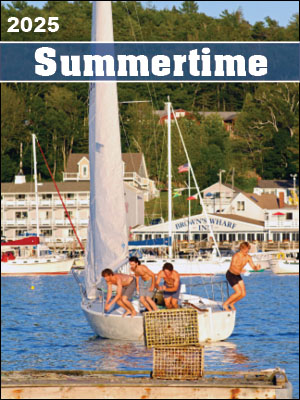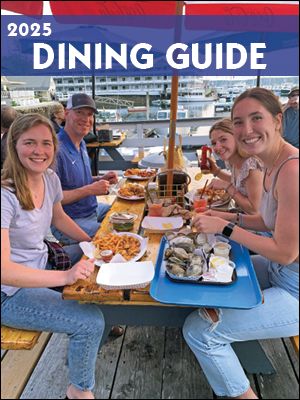BRES seventh grader Colby Doucette wins essay contest
Colby Doucette, a seventh grader at Boothbay Region Elementary School, was one of two Maine students honored Monday, April 24 as winners of the 2022 Maine Native American History and Culture Essay Contest.
Doucette, son of Jessica and Michael Doucette of Boothbay, was on hand with his parents, teacher and classmates to receive the award in Augusta from Secretary of State Shenna Bellows.
Doucette’s essay, “Birch Bark Canoes,” won the middle school division of the contest and Madeline Wagner, a 10th grader at Winthrop High School, won high school first place for her essay, “The Importance of Basket Weaving to the Wabanaki.”
As explained on the Secretary of State’s website, “Open to students in Maine middle and high schools, this contest calls on students to explore at least one aspect of the history of Indigenous People in Maine, and then to write an essay of between 500-1000 words. Topics may include, but are not limited to, the history of Native American diplomacy, relations between the tribes, relations with European settlers, aspects of Native American economics, the migrations of Native American peoples or effects of treaties with European settlers.”
This was the second straight year a BRES student has won the contest. According to BRES teacher Colleen Hennessy, Ronan Drage came in first last year. His essay was titled "Wabanaki Dawn Versus The First Light.”
“I had my social studies kids enter last year but this year I'm only teaching English so it was my seventh grade English students who entered,” said Hennessey. “They all received a participation certificate and Secretary Bellows said she read all the essays herself.
“Students in past years had attended Wabanaki programs run by the Damariscotta River Association, and during COVID, they lent BRES a birch bark canoe that had been in our lobby. I focused on the importance of story-telling and being able to tell your own story in a convincing way so that you can impact decision-makers and current issues about sovereignty, land rights, and stereotypes/mascots still facing Maine's tribes.”
The contest deadline is in November and Hennessey said it is a huge challenge to prepare the students to research and write this kind of essay so early in the year.
“They don't believe they can do it, but almost everyone completes it and chooses to submit it to the contest so they gain confidence and knowledge that with the right help, they can do more than they thought. To me, this is really what middle school is about – figuring out what you can be and do as a teenager if adults give you more responsibility and let you experiment as a student.”
“Without learning about the history and culture of indigenous Mainers, local students would have an incomplete knowledge of our state and their home,” said Bellows in a press release. “For Wabanaki and other indigenous students in Maine, inclusion of Wabanaki studies reinforces that their communities, heritage and culture are an essential part of both our shared history and our present.”
Bellows encourages students and all Mainers to explore the holdings of the Maine State Archives, where they can view Maine’s original treaties with native peoples and original field books of early Maine land surveyors. Many of these documents have been digitized for online access at https://digitalmaine.com/native_tribal_docs/
To learn more about this contest and other student programs offered by the Office of the Secretary of State, visit https://www.maine.gov/sos/kids/programs

